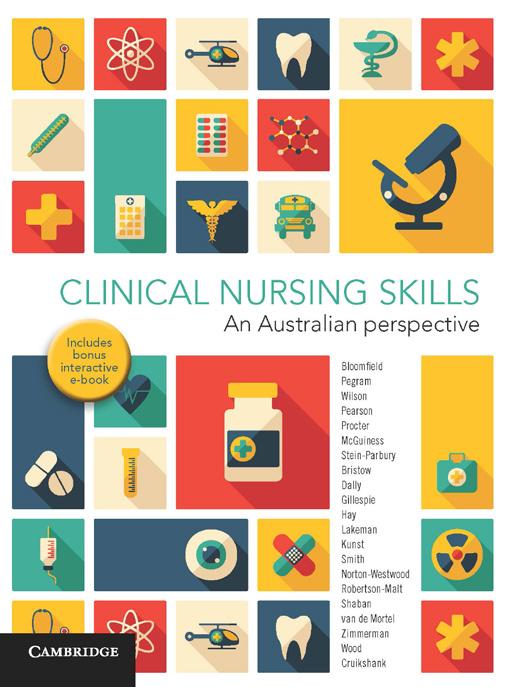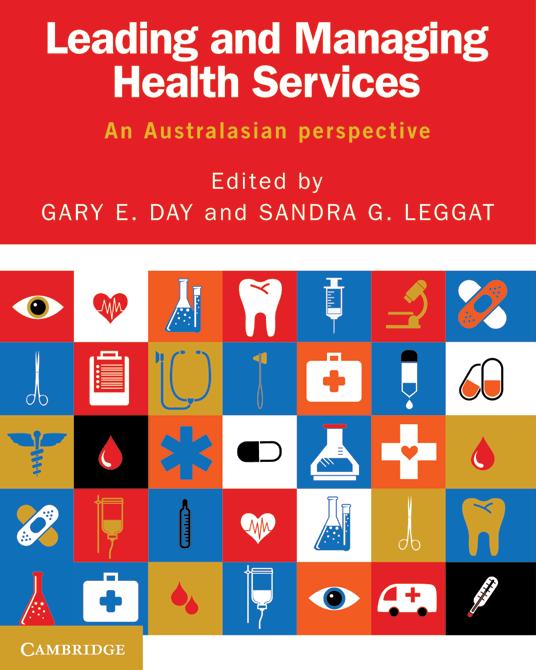
2 minute read
General
Available Now 2016, 255 x 190 mm, 544 pp 9781316620212 | Paperback (also available as an eBook)
Clinical Nursing Skills
An Australian Perspective
Jacqueline Bloomfield, Anne Pegram, Rhonda Wilson, Alan Pearson, Nicholas Procter, William McGuiness, Jane Stein-Parbury, Sally Bristow, Julie Dally, Brigid Gillespie, Benjamin Hay, Richard Lakeman, Deborah Norton-Westwood, Zaneta Smith, Elicia Kunst, Suzanne Robertson-Malt, Ramon Z. Shaban, Thea van de Mortel, Peta-Anne Zimmerman, Erica Wood, Marilyn Cruickshank, Nikki Brown, Kate Cameron, Chris Christensen, Colleen Doyle, Terri Dunstan, Monika Ferguson, Janet Green, David Jackson, Liz Mackey, Dorothy Manwa, Christine Michael and Kylie Rushford
Written by leading academics, this text is a practical and authoritative resource designed to educate the next generation of nurses and equip them with best-practice skills as they enter the workforce. Topics in this text are based on the national standards for practice, linking knowledge, understanding and practice.
Contents
Part I. Skills in Nursing: 1. The Australian healthcare context; 2. Clinical skills and nursing care; 3. An introduction to evidence-based practice in nursing; Part II. Communication and Assessment: 4. Interpersonal communication skills; 5. Patient assessment; Part III. Fundamental Skills for Patient Care: 6. Infection prevention and control; 7. Personal hygiene; 8. Elimination; 9. Nutrition; 10. Medication administration; 11. Promoting comfort; 12. Mental health; 13. Respiratory skills; 14. Perioperative care; 15. Blood transfusion; 16. Wound management; Part IV. Skills Required to Care for Patients with Specific Needs: 17. Care of the deteriorating and unconscious patient; 18. Essential paediatric and neonatal skills; 19. Care of the elderly; 20. Care of the person with a chronic disease.
Request an inspection copy Available Now 2015, 255 x 190 mm, 400 pp 9781107486393 | Paperback (also available as an eBook)

Leading and Managing Health Services
An Australasian Perspective
Edited by Gary E. Day, Griffith University Sandra G. Leggat, La Trobe University
Leading and Managing Health Services features a rich pedagogy both in the text and on its companion website; a contemporary approach to learning in line with the Health LEADS Australia framework; case studies; and a wealth of reflective, short answer and multiple-choice questions to extend student learning.
Contents
Part I. Introduction: 1. Concepts of leadership and management in health services; 2. Leadership and management frameworks and theories; Part II. Leads Self: 3. Ethical leadership; 4. Self-management; 5. Emotional intelligence and self-awareness; 6. Exploring values; 7. Ambiguity and leadership; 8. Leadership and critical reflective practice; Part III. Engages Others: 9. Communication leadership; 10. Leading interprofessional teams; 11. Clinical governance; 12. Partnering with stakeholders; 13. Power and political astuteness; 14. Influencing strategically; 15. Networking; Part IV. Achieves Outcomes: 16. Holding to account; 17. Critical thinking and decision-making; 18. Managing and leading staff; 19. Project management; 20. Financial management; 21. Negotiating; Part V. Drives Innovation: 22. Creativity and visioning; 23. Evidence-based practice; 24. Successfully managing conflict; 25. Building positive workplace cultures; 26. Leading and managing change; 27. Quality and service improvement; Part VI. Shapes Systems: 28. Workforce-planning; 29. Strategic planning; 30. Health service planning.
Request an inspection copy








